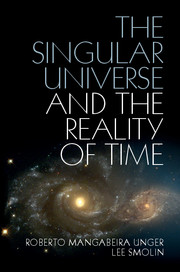Book contents
- Frontmatter
- Contents
- The nature and scope of this work
- Part I Roberto Mangabeira Unger
- 1 The science of the one universe in time
- 2 The context and consequences of the argument
- 3 The singular existence of the universe
- 4 The inclusive reality of time
- 5 The mutability of the laws of nature
- 6 The selective realism of mathematics
- Part II Lee Smolin
- Acknowledgments
- References
- A note concerning disagreements between our views
- Index
- References
1 - The science of the one universe in time
Published online by Cambridge University Press: 05 December 2014
- Frontmatter
- Contents
- The nature and scope of this work
- Part I Roberto Mangabeira Unger
- 1 The science of the one universe in time
- 2 The context and consequences of the argument
- 3 The singular existence of the universe
- 4 The inclusive reality of time
- 5 The mutability of the laws of nature
- 6 The selective realism of mathematics
- Part II Lee Smolin
- Acknowledgments
- References
- A note concerning disagreements between our views
- Index
- References
Summary
The singular existence of the universe
This book develops three connected ideas about the nature of the universe and of our relation to it. The first idea is that there is only one universe at a time. The second idea is that time is real and inclusive. Nothing, including the laws of nature, stands outside time. The third idea is that mathematics has this one real, time-drenched world as its subject matter, from a vantage point abstracting from both time and phenomenal particularity.
On the view defined by these three ideas, the universe is all that exists. That there is only one universe at a time justifies using the terms universe and world interchangeably. If there were a plurality of universes, the world would be that plurality. The singular universe must, however, be distinguished from the observable universe, for our universe may be much larger than the part of it that we can observe. In this book, we use the words cosmology and cosmological to designate what pertains to the universe as a whole, not just to its observable portion. Observational astronomy has continued, in recent decades, to make remarkable discoveries about the observable universe. Cosmology, however, risks losing its way. The arguments of this work are cosmological: they concern the whole of the universe and the way to think about it.
- Type
- Chapter
- Information
- The Singular Universe and the Reality of TimeA Proposal in Natural Philosophy, pp. 5 - 45Publisher: Cambridge University PressPrint publication year: 2014

